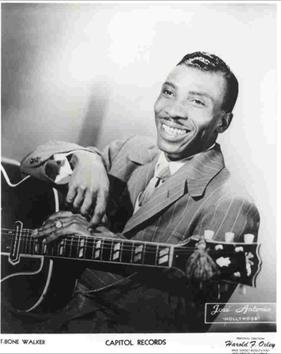Aaron Thibeaux “T-Bone” Walker (May 28, 1910 – March 16, 1975) was an American blues guitarist, singer, songwriter and multi-instrumentalist, who was a pioneer and innovator of the jump blues and electric blues sound. In 2018 Rolling Stone magazine ranked him number 67 on its list of “The 100 Greatest Guitarists of All Time”. In March 1975, Walker died due to health issues in his Los Angeles home.
T-Bone was born in Linden, Texas, of African-American and Cherokee descent. His parents, Movelia Jimerson and Rance Walker, were both musicians. His stepfather, Marco Washington, taught him to play the guitar, ukulele, banjo, violin, mandolin, and piano.
Walker began his career as a teenager in Dallas in the 1920s. His mother and stepfather (a member of the Dallas String Band) were musicians, and Blind Lemon Jefferson, a family friend, sometimes came over for dinner. Walker left school at the age of 10, and by 15 he was a professional performer on the blues circuit. Initially, he was Jefferson’s protégé and would guide him around town for his gigs.
In 1929, Walker made his recording debut with Columbia Records, billed as Oak Cliff T-Bone, releasing the single “Wichita Falls Blues” backed with “Trinity River Blues”. Oak Cliff is the community in which he lived at the time, and T-Bone is a corruption of his middle name. The pianist Douglas Fernell played accompaniment on the record.
Walker married Vida Lee in 1935; the couple had three children.
Walker was posthumously inducted into the Blues Hall of Fame in 1980 and the Rock and Roll Hall of Fame in 1987.
Chuck Berry named Walker and Louis Jordan as his main influences.[16] B.B. King cited hearing Walker’s recording of “Stormy Monday” as his inspiration for getting an electric guitar.[17] In his 1996 autobiography, King commented when first heard Walker, he thought “Jesus Himself had returned to earth playing electric guitar.
T-Bone’s blues filled my insides with joy and good feeling. I became his disciple. And remain so today. My biggest musical debt is to T-Bone.” Walker was admired by Jimi Hendrix, who imitated Walker’s trick of playing the guitar with his teeth. Steve Miller stated that in 1952, when he was eight, Walker taught him how to play his guitar behind his back and also with his teeth.
“Walker may have been the best R&B guitarist“
He was a family friend and a frequent visitor to Miller’s family home and Miller considers him a major influence on his career. “Stormy Monday” was a favorite live number of the Allman Brothers Band. The British rock band Jethro Tull covered Walker’s “Stormy Monday” in 1968 for John Peel’s “Top Gear”. Eva Cassidy performed “Stormy Monday” on her 1996 Live at Blues Alley recording.
According to Cleveland.com, Walker may have been the best R&B guitarist. He “pioneered electric blues by becoming the first artist to make the electric guitar a solo instrument and a true centerpiece of his stunning live shows”.
Compiled by SHARON Q.
Read more on Wikipedia



